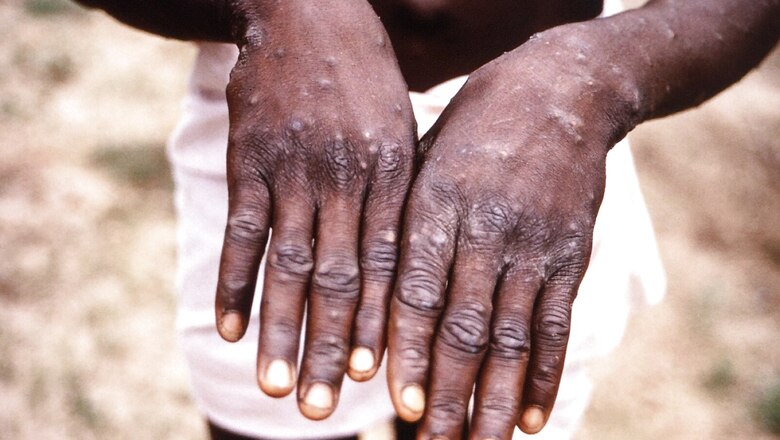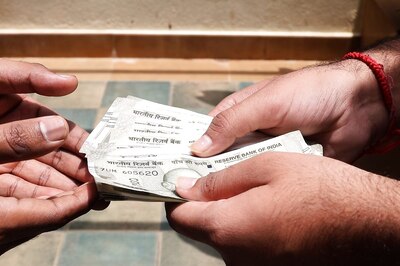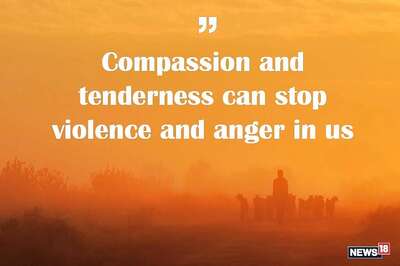
views
Activating its highest alert level, the World Health Organisation on Saturday declared monkeypox a public health emergency of international concern. In the current scenario where monkeypox is spreading across the globe, this declaration serves as an urgent call for action. This designation signifies that the WHO now views the outbreak as a potent threat to global health and a coordinated international response is needed to prevent the virus from escalating into a pandemic.
Earlier, the UN health body had declined to declare a global emergency in response to monkeypox but was pushed to do so after infections started rising rapidly over the past several weeks.
“I have decided that the global #monkeypox outbreak represents a public health emergency of international concern,” WHO chief Tedros Adhanom Ghebreyesus said at a press conference.
He said a committee of experts who met on Thursday was unable to reach a consensus, so it fell on him to decide whether to trigger the highest alert possible.
“WHO’s assessment is that the risk of monkeypox is moderate globally and in all regions, except in the European region where we assess the risk as high,” he added.
What is the Monkeypox Virus?
Monkeypox is a disease that is caused by the monkeypox virus, capable of spreading from animals to humans and has been reported to the tune of 2,000 since January with one reported death. Monkeypox is an infectious disease that is usually mild and is endemic in parts of west and central Africa. It is spread by close contact, so it can be relatively easily contained through measures such as self-isolation and hygiene. Most of the cases reported so far have been detected in the UK, Spain, and Portugal. “The vast majority of reported cases so far have no established travel links to an endemic area and have presented through primary care or sexual health services,” the UN agency said.
WHO Chief Tedros had earlier also expressed distress at the inaction on the part of the international community with regard to recognizing and curbing the spread of the Monkeypox virus which has been killing people in Africa for decades.
Symptoms of Monkeypox?
Initially, the symptoms of this virus were deemed to be similar to those of the flu, including fever, headache, muscle aches, chills, exhaustion, and swollen lymph nodes. The disease then however progressed into a rash that can spread over the body. Patients are considered most infectious when the rash develops. But in the current outbreak, the symptoms have been atypical. Some people are developing a rash first, while others are showing a rash without any flu-like symptoms at all. Many patients have developed a localized rash on their genitals and anus.
How to steer Clear of Monkeypox?
The US CDC recommends that people avoid intimate physical contact with individuals who have a rash that looks like monkeypox, and consider minimizing sex with multiple or anonymous partners. People should also consider avoiding sex parties or other events where people aren’t wearing a lot of clothing. Although monkeypox can spread through respiratory droplets, that method requires prolonged face-to-face interaction, according to the CDC. Monkeypox can also spread through contact with contaminated materials, such as bedsheets and clothing.
Who are at the Highest Risk?
Though the WHO and the CDC have emphasized that anyone can catch monkeypox regardless of sexual orientation, men who have sex with men are at the highest risk right now, as the majority of transmission has occurred in the gay community.
Cases in India
India has reported three cases of Monkeypox so far, all from Kerala. India’s third monkeypox was confirmed in a 35-year-old man who returned to Mallapuram from UAE on 6 July. “He was admitted with fever at Manjerry Medical College Hospital on 13 and from 15 he began showing symptoms. His family and close contacts under observation” said Kerala’s Health Minister Veena George.
Earlier the state government on Wednesday issued standard operating procedures (SOP) for isolation, sample collection and treatment of those infected or showing signs of the disease and at the same time said there was nothing to be concerned about.
In the wake of these cases, the Centre wrote to states urging them to take precautionary measures a week back.
In a letter to all states, Union Health Secretary Rajesh Bhushan asked them to test and screen suspects at all points of entry. Authorities were also been asked to conduct regular orientation programs for all health officials.
Global Impact of Monkeypox
Monkeypox has affected over 15,800 people in 72 countries, according to a tally by the US Centers for Disease Control and Prevention (CDC) published on July 20.
According to WHO data, Europe is currently the global epicenter of the outbreak, reporting more than 80% of confirmed infections worldwide in 2022. The U.S. has reported more than 2,000 cases across 43 states, Washington, D.C. and Puerto Rico. In May this year, the United Kingdom reported a case of monkeypox in a person who recently returned from travel to Nigeria. Several days later, the U.K. reported three more cases of monkeypox in people who appeared to have become infected locally. Other European nations, Canada and the U.S. then also began confirming cases.
Vaccines
The European Union’s drug watchdog on Friday recommended for approval the use of Imvanex, a smallpox vaccine, to treat monkeypox. Imvanex, developed by Danish drugmaker Bavarian Nordic, has been approved in the EU since 2013 for the prevention of smallpox. It was also considered a potential vaccine for monkeypox because of the similarity between the monkeypox virus and the smallpox virus.
WHO expert Dr. Rosamund Lewis however in a video shared by the world health body, explained why the risk of Monkeypox has been said to be “moderate”. Lewis answered various questions related to the disease and also assured us that it causes mild illness.
“Most people who contract the virus do not become seriously ill. However, the risk has been described as moderate because it’s spreading to locations where it has never been reported before. So this new pattern of spread is concerning. So WHO aims to identify where the risk may be, and who may be at risk. This is the message we’re sending – If you know your own risk, you can lower your risk,” she explained.
(With inputs from agencies)
Read all the Latest News and Breaking News here

















Comments
0 comment